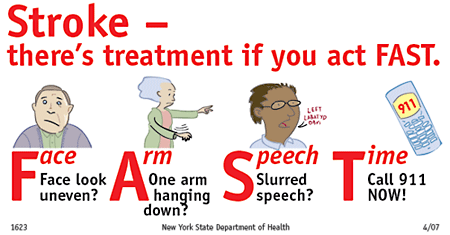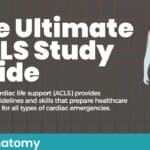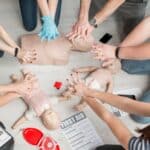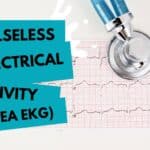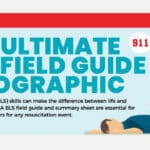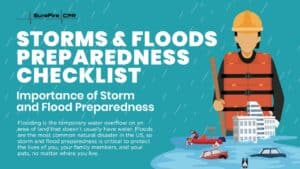Mention the word, “Stroke” and all types of reactions occur. People are acutely aware of the critical nature that comes with Cerebrovascular Accidents (aka: Stroke). Fortunately, that type of public awareness has made it easier for victims of a CVA to receive the timely treatment required to possibly reverse and/or treat the devastating effects of a stroke. Health care journals have defined CVA as:
The sudden death of brain cells due to lack of oxygen when the blood flow to the brain is impaired by blockage or rupture of an artery to the brain. (medicine.net)
Differentiating between types of CVA’s has been a relatively new discovery that has allowed for precise handling of the specific stroke on an immediate level. Not all patients suffering from CVA qualify for the same treatment. Likewise, not all treatments support the same outcome. One critical point remains consistent across the board for all possible stroke victims – time.
ACT FAST For Stroke Victims
The acronym, ACT FAST has become a popular adage to help the general population remember what to do when a stroke is suspected. Using the word FAST as a guideline, the layperson can check for specific signs and symptoms that would indicate a possible stroke has or is occurring. As recommended by the National Stroke Association the observer would ask the following tasks to be performed by the suspected victim:
F – Ask the person to smile. Does one side of the face droop?
A– Ask the person to raise both arms. Does one arm drift downward?
S – Ask the person to repeat a simple phrase (such as Mary Had A Little Lamb). Is their speech slurred or strange?
T– Time! If you observe any of these signs, call 911 immediately.
Recognizing the signs and symptoms of a stroke are only the beginning. Making certain to get the victim of stroke to emergency medical personnel as soon as possible is key to a more positive outcome with CVA. All hospital emergency staff and pre-hospital emergency personnel are trained in specific interventions designed to aid the victim of a CVA. SureFire CPR located in Orange County, California is a training facility designed to certify professionals and the public alike in the management and care of CVA victims.
In spite of the similarity in presentation, not all CVA’s are alike. Three main causes for CVA differentiate the types of injury causing the stroke:
· Ischemic Stroke occurs as a result of an obstruction within a blood vessel supplying blood to the brain. It accounts for 87 percent of all stroke cases.
· Hemorrhagic Stroke occurs when a weakened blood vessel ruptures. Two types of weakened blood vessels usually cause hemorrhagic stroke: aneurisms and arteriovenous malformations (AVM). The most common cause of a hemorrhagic stroke is uncontrolled hypertension or high blood pressure.
· Transient Ischemic Attack (or TIA) is caused by the formation of a temporary clot. Often called a “mini stroke”, these warning strokes should be taken very seriously.
Taking steps to educate oneself on the signs and symptoms of a CVA or stroke can be life-saving for an unsuspecting loved one or associate who may fall victim to the effects of an acute stroke. Time spent with the experienced and friendly trainers at SureFire CPR will prove invaluable when faced with the distress that accompanies someone suffering from a STROKE.

